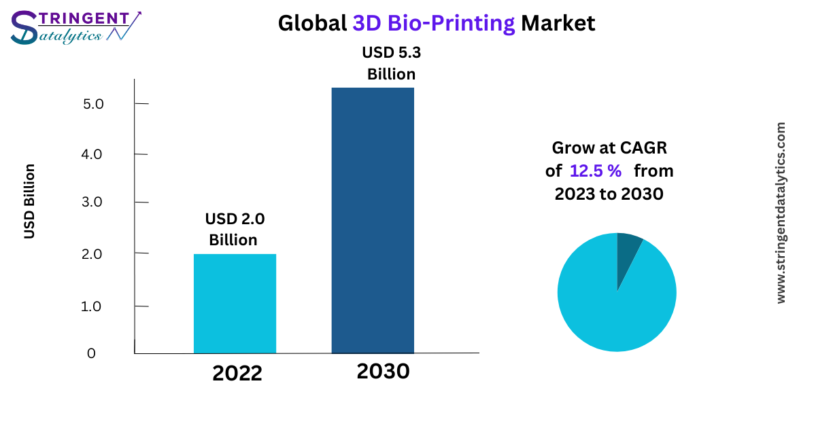3D Bio-Printing Market size was valued at USD 2.0 billion in 2022, is projected to reach USD 5.3 billion by 2030 iand growing at a compound annual growth rate (CAGR) of 12.5% from 2023 to 2030.
The 3D bio-printing market is a rapidly evolving sector within the broader field of biotechnology and regenerative medicine, offering innovative solutions for tissue engineering, organ transplantation, drug discovery, and personalized medicine. 3D bio-printing technology enables the precise deposition of living cells, biomaterials, and biological factors layer by layer to create complex three-dimensional structures that mimic the architecture and function of native tissues and organs.
Key components of the 3D bio-printing market include:
- Bio-printers: Bio-printers are specialized 3D printing platforms designed to accommodate living cells and biomaterials for the fabrication of biological constructs. These printers utilize various printing technologies, including extrusion-based printing, inkjet-based printing, laser-assisted printing, and stereolithography, each offering unique advantages in terms of resolution, speed, and compatibility with different bio-ink formulations.
- Bio-Inks: Bio-inks are biocompatible materials loaded with living cells, growth factors, and other bioactive agents used as building blocks for bio-printing. Common bio-ink components include hydrogels (such as alginate, collagen, gelatin, and hyaluronic acid), cell-laden microspheres, and decellularized extracellular matrix (ECM) derived from natural tissues. Advanced bio-inks may incorporate stimuli-responsive polymers, nanomaterials, or bioactive molecules to enhance cell viability, differentiation, and tissue maturation.
- Applications: The 3D bio-printing market encompasses a wide range of applications across biomedical research, preclinical testing, and clinical translation. Major application areas include:
- Tissue Engineering: Bio-printed tissues and organs hold promise for regenerating damaged or diseased tissues, repairing traumatic injuries, and replacing malfunctioning organs. Examples include bio-printed skin grafts, cartilage constructs, bone scaffolds, and vascularized organoids.
- Drug Discovery and Development: Bio-printed tissue models provide physiologically relevant platforms for drug screening, toxicity testing, and disease modeling, enabling more accurate prediction of drug responses and reducing reliance on animal models.
- Bioprinted Implants and Prosthetics: Customized implants, prostheses, and medical devices fabricated using 3D bio-printing technology offer improved biocompatibility, patient-specific design, and integration with host tissues, enhancing clinical outcomes and patient satisfaction.
- Regulatory Landscape: The regulatory landscape for 3D bio-printing technologies is evolving, with regulatory agencies such as the U.S. Food and Drug Administration (FDA) providing guidelines for the development, validation, and approval of bio-printed products for clinical use. Key considerations include safety, efficacy, quality control, and manufacturing standards to ensure the reliability and reproducibility of bio-printed constructs.
- Market Growth Drivers: The 3D bio-printing market is fueled by factors such as increasing demand for regenerative medicine solutions, growing investment in research and development, advancements in bio-ink formulations and printing technologies, and rising prevalence of chronic diseases necessitating innovative treatment options. Moreover, collaborations between academia, industry, and healthcare organizations are driving innovation and accelerating the translation of bio-printed technologies from bench to bedside.
Click Here, To Get Free Sample Report https://stringentdatalytics.com/sample-request/3d-bio-printing-market/14828/
Market Segmentations:
Global 3D Bio-Printing Market: By Company
Organovo
Cyfuse Biomedical
BioBots
Luxexcel Group
Aspect Biosystems
3Dynamics Systems
Stratasys
Voxeljet
Materialise
Solidscape
Global 3D Bio-Printing Market: By Type
Magnetic Levitation
Inkjet Based 3D Bioprinting
Syringe Based 3D Bioprinting
Laser Based 3D Bioprinting
Others
Global 3D Bio-Printing Market: By Application
Medical
Dental
Biosensors
Food and Animal Product Bioprinting
Others
Global 3D Bio-Printing Market: Regional Analysis
The regional analysis of the global 3D Bio-Printing market provides insights into the market’s performance across different regions of the world. The analysis is based on recent and future trends and includes market forecast for the prediction period. The countries covered in the regional analysis of the 3D Bio-Printing market report are as follows:
North America: The North America region includes the U.S., Canada, and Mexico. The U.S. is the largest market for Cold-chain Pharma in this region, followed by Canada and Mexico. The market growth in this region is primarily driven by the presence of key market players and the increasing demand for the product.
Europe: The Europe region includes Germany, France, U.K., Russia, Italy, Spain, Turkey, Netherlands, Switzerland, Belgium, and Rest of Europe. Germany is the largest market for Cold-chain Pharma in this region, followed by the U.K. and France. The market growth in this region is driven by the increasing demand for the product in the automotive and aerospace sectors.
Asia-Pacific: The Asia-Pacific region includes Singapore, Malaysia, Australia, Thailand, Indonesia, Philippines, China, Japan, India, South Korea, and Rest of Asia-Pacific. China is the largest market for Cold-chain Pharma in this region, followed by Japan and India. The market growth in this region is driven by the increasing adoption of the product in various end-use industries, such as automotive, aerospace, and construction.
Middle East and Africa: The Middle East and Africa region includes Saudi Arabia, U.A.E, South Africa, Egypt, Israel, and Rest of Middle East and Africa. The market growth in this region is driven by the increasing demand for the product in the aerospace and defense sectors.
South America: The South America region includes Argentina, Brazil, and Rest of South America. Brazil is the largest market for Cold-chain Pharma in this region, followed by Argentina. The market growth in this region is primarily driven by the increasing demand for the product in the automotive sector.
Click Here, To Buy Premium Report https://stringentdatalytics.com/purchase/3d-bio-printing-market/14828/?license=single
Key Indicators Analysed
Market Players & Competitor Analysis: The report covers the key players of the industry including Company Profile, Product Specifications, Production Capacity/Sales, Revenue, Price and Gross Margin 2016-2027 & Sales with a thorough analysis of the market’s competitive landscape and detailed information on vendors and comprehensive details of factors that will challenge the growth of major market vendors.
Global and Regional Market Analysis: The report includes Global & Regional market status and outlook 2016-2027. Further the report provides break down details about each region & countries covered in the report. Identifying its sales, sales volume & revenue forecast. With detailed analysis by types and applications.
Market Trends: Market key trends which include Increased Competition and Continuous Innovations.
Opportunities and Drivers: Identifying the Growing Demands and New Technology
Porters Five Force Analysis: The report provides with the state of competition in industry depending on five basic forces: threat of new entrants, bargaining power of suppliers, bargaining power of buyers, threat of substitute products or services, and existing industry rivalry
About Stringent Datalytics
Stringent Datalytics offers both custom and syndicated market research reports. Custom market research reports are tailored to a specific client’s needs and requirements. These reports provide unique insights into a particular industry or market segment and can help businesses make informed decisions about their strategies and operations.
Syndicated market research reports, on the other hand, are pre-existing reports that are available for purchase by multiple clients. These reports are often produced on a regular basis, such as annually or quarterly, and cover a broad range of industries and market segments. Syndicated reports provide clients with insights into industry trends, market sizes, and competitive landscapes. By offering both custom and syndicated reports, Stringent Datalytics can provide clients with a range of market research solutions that can be customized to their specific needs.
Contact Us
Stringent Datalytics
Contact No- +1 346 666 6655
Email Id- sales@stringentdatalytics.com
Web- https://stringentdatalytics.com/




Leave a Reply